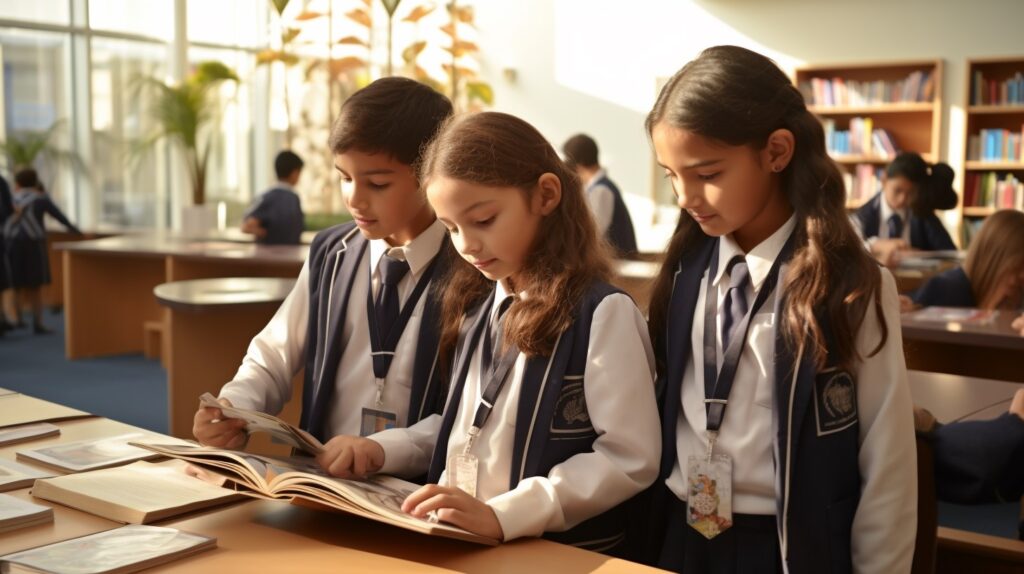Introduction
In the heart of Dubai, a city renowned for its skyscrapers and luxury living, there lies another, often overlooked, dimension that significantly shapes its urban tapestry: the educational institutions. Over the years, Dubai has experienced remarkable growth in its educational sector, which has profoundly impacted the city’s real estate landscape. From sprawling university campuses to elite international schools, these learning centers have become pivotal in driving real estate development and demand in various parts of the city. This article delves into the symbiotic relationship between educational institutions and Dubai’s real estate, exploring how this interplay shapes the city’s development and offers opportunities for investors and residents alike.
The Rise of Education Hubs in Dubai
Dubai’s commitment to becoming a knowledge-based economy is exemplified in the development of dedicated education hubs like Dubai Knowledge Park and Dubai International Academic City. These zones, designed to foster learning and innovation, have become home to numerous world-renowned universities and educational institutions. Dubai Knowledge Park, for instance, focuses on training and learning centers, while Dubai International Academic City houses globally recognized universities, attracting students worldwide.
These educational hubs have established Dubai as a regional center for higher education and have also led to the development of surrounding areas. The influx of students, faculty, and administrative staff has created a demand for residential properties, retail outlets, and leisure facilities. Consequently, these regions have seen a surge in real estate development, including student accommodation, apartments, and townhouses, catering to the needs of the academic community.
Real Estate Trends Around Educational Hubs
A dynamic and ever-evolving landscape characterizes the real estate market near Dubai’s educational hubs. Areas surrounding Dubai Knowledge Park and Dubai International Academic City have witnessed a noticeable upswing in property demand, particularly for residential units. This demand is primarily driven by the need for student housing, faculty residences, and accommodations for visiting families.
The properties in these areas range from affordable studio apartments to luxurious villas catering to a diverse demographic. The price ranges vary, with premium pricing observed in properties that offer additional amenities like proximity to educational institutions, transport links, and recreational facilities. For instance, residential developments in these areas often feature community centers, sports facilities, and green spaces, enhancing their appeal to families and long-term residents.
Investors have taken a keen interest in these areas, recognizing the steady demand for rental properties driven by the academic calendar. The consistent influx of students ensures a regular rental market, providing property owners with a reliable return on investment. This trend has encouraged developers to focus on building quality residential projects that meet the specific needs of this segment, including shared accommodation options, studio apartments, and one-bedroom units.

Educational Institutions as Catalysts for Community Development
In Dubai, educational institutions have become more than just learning centers; they catalyze comprehensive community development. This phenomenon is particularly evident in areas surrounding major educational hubs like Dubai Knowledge Park and Dubai International Academic City. These institutions have attracted students from across the globe and fostered the development of vibrant, multifaceted communities.
Take Dubai Knowledge Village as a case study. Established as a hub for learning and professional development, it has spurred the growth of a surrounding community rich in amenities and residential options. The area now boasts a variety of housing, from affordable apartments to upscale villas, catering to students, faculty, and professionals working in the vicinity. This diversification in housing has created a dynamic and inclusive community, offering something for every demographic.
The impact of these educational institutions extends to the development of retail, dining, and recreational facilities. To cater to the diverse population, the area has seen an influx of cafes, restaurants, shops, and leisure and wellness centers. These amenities serve the immediate community and attract visitors from other parts of Dubai, adding to the area’s vibrancy.
Furthermore, the presence of educational institutions has improved infrastructure and transportation links, making these areas more accessible and desirable for living. Enhanced road networks, public transportation, and pedestrian-friendly spaces have increased the connectivity of these educational zones with the rest of Dubai, thereby boosting the overall appeal of the surrounding real estate.
Investment Opportunities in Properties Near Educational Institutions
The burgeoning development around Dubai’s educational institutions presents lucrative investment opportunities in the real estate sector. The constant flow of students, faculty, and academic staff creates a perennial demand for housing, making properties in these areas a wise investment choice. Investors looking to capitalize on rental income will find these regions attractive due to the steady influx of tenants.
Properties near educational hubs like Dubai Knowledge Park and Dubai International Academic City are especially appealing for their potential return on investment (ROI). The demand for student accommodations, ranging from dormitories to private apartments, offers a stable rental market. Additionally, the need extends beyond just housing; there are opportunities to develop and invest in commercial properties, such as retail spaces, cafes, and other student-oriented services.
Investors can also explore opportunities to develop boutique hotels or serviced apartments catering to visiting parents, academic guests, and students seeking short-term accommodations. These developments can tap into a niche market, providing amenities and services tailored to the needs of the academic community.
Moreover, the continuous expansion of educational institutions in Dubai suggests long-term sustainability for investments in these areas. The commitment of the Dubai government to education and a knowledge-based economy ensures ongoing development and enhancement of these zones, further solidifying their potential as lucrative real estate investment hubs.

Future Outlook: Education and Real Estate Synergy in Dubai
As Dubai continues to evolve as a global educational hub, the synergy between the educational sector and real estate is poised to enter a new phase of growth and development. The future landscape of this interconnectedness is likely to be shaped by several critical factors, including the expansion of existing educational institutions, the introduction of new educational models, and the increasing internationalization of Dubai’s student population.
One anticipated trend is the expansion of educational campuses and establishing new learning institutions, including international branch campuses and specialized training centers. This growth will naturally stimulate further development in surrounding areas, particularly in providing student accommodations, faculty housing, and community amenities. As these educational zones expand, they will continue to drive demand for diverse real estate developments, ranging from affordable student housing to upscale residential complexes.
Another factor shaping the future is the potential shift towards more integrated educational communities. These communities would blend academic facilities with residential, commercial, and recreational spaces, creating holistic environments that cater to the needs of students, educators, and support staff. Such developments could include features like on-site research parks, startup incubators, and collaborative spaces that encourage innovation and community engagement.
As Dubai’s educational institutions attract a more diverse international student body, the real estate market must adapt to cater to this multicultural demographic. This could manifest in developing more culturally inclusive housing options, community spaces, and amenities catering to a wide range of international tastes and preferences.
Conclusion
The relationship between educational institutions and real estate in Dubai is dynamic and multifaceted, offering insights into the city’s development strategy and future aspirations. Educational institutions have become much more than places of learning; they are catalysts for comprehensive community development, driving real estate growth and diversifying the city’s urban landscape. As Dubai continues to invest in its educational sector, the impact on real estate is significant, creating vibrant communities, fostering innovation, and providing lucrative investment opportunities.
The continued expansion and internationalization of Dubai’s educational institutions will likely stimulate the real estate market further, contributing to the city’s evolution as an innovative and sustainable urban environment. This synergy between education and real estate underscores Dubai’s commitment to fostering a knowledge-based economy and positions the city as a leading destination for teaching and living in the region. The future holds exciting prospects for this interplay, promising continued growth, innovation, and opportunities for investors, developers, educators, and students.
